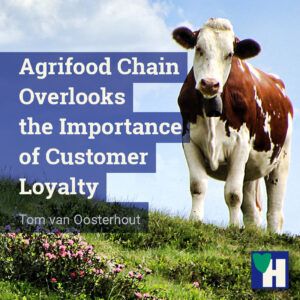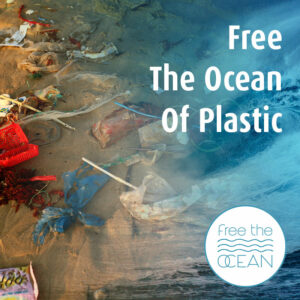
The importance of customer loyalty is overlooked by the agrifood chain. The loyalty of consumers is questioned by acting as if they’re stupid. That is one of the opinions I shared in the series of articles I recently wrote about the agrifood complex and its impact on customers.
The first article discussed the food anxiety depression that’s sold to us by governments, agrifood businesses, and scientists.
The second article introduced the debate about food safety.
The third article explained the complexity of the debate about food and the food industry.
In this article, I express my surprise about the lack of the food industry’s confidence in their own capacities. I will illustrate this with two examples. The first is the dairy debate that emerged in The Netherlands at the beginning of the 21st century. The next is the false claims in the European Parliament that the European Green Deal will cause food shortages.
Some of the links are affiliate links. As an affiliate associate, we earn a commission when you purchase any of the products offered through the shared links at no extra cost for you. This helps us maintain this website.
Table of contents
- 1 The importance of customer loyalty
- 2 Dairy is tasty and healthy
- 3 Pop art cows and shining green meadows
- 4 Where starts the environmental debate about dairy?
- 5 The importance of customer loyalty starts with responsibility
- 6 Now my wooden shoes break
- 7 In 2030 Europe faces food shortages
- 8 False claims about the importance of customer loyalty
The importance of customer loyalty
The importance of customer loyalty can be overlooked. But it can also be underestimated. I demonstrate this underestimation with two examples. One is about the dairy industry in The Netherlands and the other about the European Green Deal.
Dairy is tasty and healthy

In 2002, the united Dutch dairy industry, and the national agriculture association, representing the farmers, wanted to start a public debate about the environmental qualities of dairy. In those days, these qualities were up for discussion.
The dairy farmers and industry wanted a public debate because, they argued, the incorrect image of the impact of dairy on the environment unjustifiably casted doubts on the quality of their products.
Why did dairy farmers and the dairy industry overlook the importance of customer loyalty? Is dairy not an attractive product for millions of people? Is dairy not beyond all doubt? Do these millions of people not enjoy dairy every day? In all conceivable forms? Is dairy not tasty and healthy?
Pop art cows and shining green meadows

The dairy farmer and industry came up with some peculiar perspectives for the debate totally leaving out the importance of customer loyalty. They said that the farmers should pay more attention to the ‘sensory experiences’ of the customers.
The meadows had to be kept shining fresh and green, and smell good. The cows must be the radiant black and white centrepiece of these meadows, a scene of fine and pure pop art.
What about the extraordinary commitment of the dairy farmers and the dairy industry to their customers? What about the superior quality of their products? What about the impact of dairy on the joy and satisfaction of millions of customers? Must all these qualities be compared with the ‘sensory experiences’ of a citizen who happens to cycle past a meadow on a Sunday afternoon?
Such a comparison is an appalling form of disdain for the dairy farmers, and industry, and for the complexity of the environmental issue. If ‘sensory experiences’ are introduced in the environmental debate, where will this end?
Where starts the environmental debate about dairy?

Research shows that the dairy industry and supermarkets hardly focus on the importance of customer loyalty. These major players exert huge powers, bending the entire industry to their convictions.
They determine the farmer’s production cycles, and what the consumer can ultimately buy. If these ‘big players’ should take the discussion about the environment seriously, why should this debate start at the doorstep of the dairy farmer? Why not at their own doorstep? Or the doorstep of the customer?
The importance of customer loyalty starts with responsibility
Imagine the environmental debate about dairy starts at the doorstep of the customer. Let all responsibility start there. Let the customer decide about the amount of nitrogen that is allowed in cow manure. Why is the importance of customer loyalty not valued outside the economic domain?
Why don’t we let the customer decide about the quality of dairy and food safety? About food control management and protocols. About biodiversity, and organic farming. And who will pay for all the customer’s desires and wishes?
Now my wooden shoes break

Wooden shoes are proverbial in The Netherlands, a country that is the number 3 worldwide in agricultural exports (and imports for that matter). When a Dutch person is truly surprised he or she says: “Now my wooden shoes break.” Although hardly anybody wears wooden shoes anymore this is still a common expression.
My wooden shoe broke when I discovered how the editorials in the media responded to the call for a dairy debate. All editorials warned that the results of the debate should not go too far.
The debate hadn’t started yet and the journalists were already concerned about the outcome. The debate might jeopardize the country’s international trade position. Why do we have to be the first again to improve the environment? What will the debate’s impact on the economy be?
In 2030 Europe faces food shortages
The debate about dairy and the environment never got started. Does this mean we learned something? For instance about the importance of customer loyalty? I doubt it. Let me illustrate my doubts with the debate in the European Parliament about the Green Deal.
A couple of members of the European Parliament (MEPs) complained some weeks ago that the European Commission consciously ignored the detrimental impact of the Green Deal, the EU’s climate program, on European agriculture.
These MEPs were warned by a report of an (unknown) American institute explaining that the Green Deal will result in 12% less agricultural production in 2030.
Customer food loyalties explained as false claims
The decline in agricultural production in Europe, as the MEPs claimed, might cause food shortages. Besides, the costs of these food shortages will end at the plates of the poorest.
The MEP’s also explained that European farmers are the most sustainable in the world. And: “A shift of EU food production abroad will lead to more global climate emissions and damage nature.” Fortunately, as I will explain below, all these claims are false.
Modern agriculture destroys biodiversity at an unprecedented rate
Food has never been as cheap as nowadays. This is mainly due to the incessant international food trade. In rich countries, fresh foods from all around the world are in abundance the whole year-round.
Even during the first weeks of the coronavirus panic, only toilet paper was in short supply. Fresh fruits and vegetables were always on the shelves. Which explains why what goes into a human being at one end, calls for different values than what goes out at the other end.
Food is also cheap because everywhere around the world artificial fertilizers, pesticides, herbicides, and fungicides are used in great amounts guaranteeing huge crops. Unfortunately, this modern type of agriculture destroys biodiversity at an unprecedented rate.
Europe and the USA export environmental problems to the poorest

The burden of our food consumption on the environment abroad has never been that heavy. The costs of this environmental destruction end up at the plate of the poorest people in the poorest nations.
The burden of the agricultural policies in Europe and the USA on the poorest in the world has many dire consequences. Agriculture in Europe and the USA is substantially subsidized. In contrast, imports from other countries are taxed with high levies. This mainly affects the poorest countries in the world.
These are also the countries with the highest famine rates. A billion people in the world do not have enough to eat. A problem which is mainly caused by the one-sided agricultural policies of Europe and the USA. These policies are aimed at producing for the rich, not at alleviating the famine of the poor.
Obesity and food waste
There are 2 other detrimental developments related to modern agriculture in the world. These developments directly contradict the MEP’s claim of food shortages in Europe in 2030. The first development is the rise of obesity. The second development is the rise of food waste.
The rise of obesity is caused by overeating. More specifically by overeating meat, sugar, and salt. Compared to obesity the coronavirus is a pandemic of very insignificant proportions.

Moreover, when all the members of the European Parliament and their political assistants, lobbyists, and administrators would stop eating meat for two days a week, the estimated 12% food shortage would never emerge. The environment would also benefit substantially.
Next to obesity, food waste is the second argument contradicting the rise of food shortages in Europe. A couple of years ago for the first time in history, the USA reached the 50% food waste limit. And Europe is close behind with an estimated food waste between 35 and 45%. A worldwide reduction of food waste by 25% will compensate for any estimated food shortage and end world famine.
False claims about the importance of customer loyalty
Our experiences are heavily burdened with feelings. These feelings determine every debate. Including environmental debates. False claims about the relation between food and the environment incite lies about the importance of customer loyalty.

These lies express that customers are stupid, are only interested in safe and cheap food, and that they fear food shortages. However, we, as customers, feel overwhelmed by our responsibilities about the environment, about poverty in the world, about the tremendous and unprecedented loss of biodiversity, about inequality in the world, about climate change.
At the same time we, as customers, are abandoned by politicians, authorities, and business managers who falsely claim they’re responsible. Those who falsely claim that all cows are supposed to be shining black and white in the meadows, the grass is supposed to be fresh and green, and that cow manure smells like roses. Technically it is all possible. But whether it seriously contributes to a better world?
What priority do you prefer when it comes to food? Safety, quality, or sustainability? Or do you have other priorities? Please let us know in the comment box.

